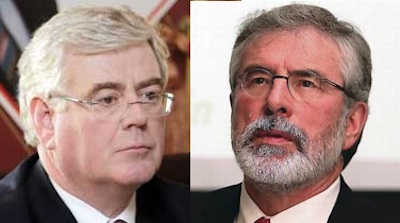
The leader of the Irish Labour Party, Eamon Gilmore, has distanced himself from a proposal by Sinn Fein to form a left-wing coalition to “take on” the main conservative parties in the 26 Counties, Fine Gael and Fianna Fail.
The proposal for future alliance was made by Sinn Fein leader Gerry Adams in his address to his party’s Ard Fheis [annual conference]. It would require a sea-change in Irish politics, long dominated by the two main conservative, right-wing parties, both with their roots on opposite sides of Ireland’s civil war.
But with Fianna Fail blamed for causing the current economic crisis, and with increasing opposition to Fine Gael’s policy of making the Irish public bear the full cost of that financial collapse, a transition to a left-right divide is being seen as a realistic possibility for the first time.
Speaking on Saturday night, Mr Adams said many of the problems that Ireland faces today are a direct result of a “toxic political culture” which arose from the “counter-revolution” that followed the 1916 Rising and the War of Independence.
“The counter-revolutionaries who succeeded Michael Collins, like their contemporaries in the North, copper-fastened Partition and the two conservative states, which it created,” he said.
“In this part of Ireland this toxic political culture led to the abuses of power in planning, in the banks, in Church and State-run institutions, and in the health service.
“An elite -- politically represented by the Fine Gael and Fianna Fail leaderships, often supported by the Labour Party -- oversaw a culture of corruption and golden circles.
“These are the same interests that collapsed the Irish economy six years ago.”
He called on ‘the Left’ in Ireland to come together to challenge the conservative establishment.
“The conservatives, the right wingers consistently unite around their issues,” he said. “Those of us who have a different vision -- a progressive, rights-based vision -- must do the same.”
But Eamon Gilmore, Labour leader and Deputy Prime Minister in the current Fine Gael/Labour coalition government, said Sinn Fein has a “long way to go” before being considered as a potential partner.
Labour leaders have previously said they want to serve a second term in a coalition with Fine Gael. While Gilmore didn’t entirely rule out the possibility of an alliance with Sinn Fein, he was critical of the party’s economic policies and said the party was burdened with outstanding issues from the conflict.
“I think Sinn Féin has a long way to go before anybody can consider them part of a government,” he said.
“In particular, I think their economic policies – if you can call them policies at all – are a bit of a fairytale.
“And I think there are some legacy issues that Sinn Féin have to address - such as, for example, what happened to [prominent IRA victim] Jean McConville and to the Disappeared.”
Responding, Gerry Adams issued a statement of his own, referring obliquely to the Tanaiste’s own past links to the Official IRA, and said Gilmore’s criticism of Sinn Fein was “a bit rich given the nightmare that Labour’s embrace of austerity and its role in government has created for working people.”
ORANGEMEN SAY NO
In another part of his address last Saturday, Mr Adams also offered to meet the Orange Order to discuss issues of identity and contentious parades. He said he wanted the marching order to treat Catholics with respect and for it to be treated with respect.
“The Orange Order of Ireland is one of our national traditions,” he told around 1,000 delegates. “Orange is one of our country’s national colours.”
He said he wanted all Ireland traditions to be free from sectarianism and to live together in peace and respect. “The tide of history is with those who seek to build a peaceful and inclusive future,” he declared.
His offer, however, was swiftly rejected by the Orange Order. In a statement, they accused the Sinn Fein leader of ‘glorifying terrorism’.
They said there could be “no possibility of any engagement with him while he continues to justify, and even glorify, the murder of hundreds of our members by the republican movement”.
‘REJECT CRIMINALISATION’
In their addresses to the ard fheis, SF deputy leader Mary Lou McDonald and Donegal TD Pádraig Mac Lochlainn both criticised Fine Gael, Fianna Fáil and Labour for repeatedly revisiting Sinn Féin’s role during the 30-year conflict and claiming it was different to the violence that took place in the years surrounding the foundation of the 26-County State.
“We didn’t let Margaret Thatcher criminalise Bobby Sands and the 1981 hunger strikers and you can be damn sure that we will not let Fianna Fáil, Fine Gael or anyone else criminalise them today,” Mr MacLochlainn told delegates, winning one of the loudest cheers of the Ard Fheis.
He said that Ireland’s Civil War and the War of Independence were both brutal affairs.
“Leinster House is a shrine to violent conflict, yet those who ruled from there demanded that the nationalist people of the Six Counties, living in an apartheid state, should take it lying down,” he said.
Ms McDonald said an argument was being made that in the absence of violence “all was well in the North”.
She criticised those who she said laid the “blame for the conflict at the feet of those communities and individuals who fought back against a rotten sectarian State”.
“Their cynical abuse of the suffering of some victims to avoid answering questions about corruption in this State is shameful. Their exploitation of some victims’ suffering to suit their party political ends and to bolster their election campaigns is utterly dishonourable.
“Instead of resorting to the cheap soundbites in the Dáil it would match Enda Kenny and Micheál Martin better to do what they have been elected to do and stand up for the interests of the people of this country.”
![[Irish Republican News]](https://republican-news.org/graphics/title_gifs/rn.gif)
![[Irish Republican News]](https://republican-news.org/graphics/title_gifs/harp.gif)

